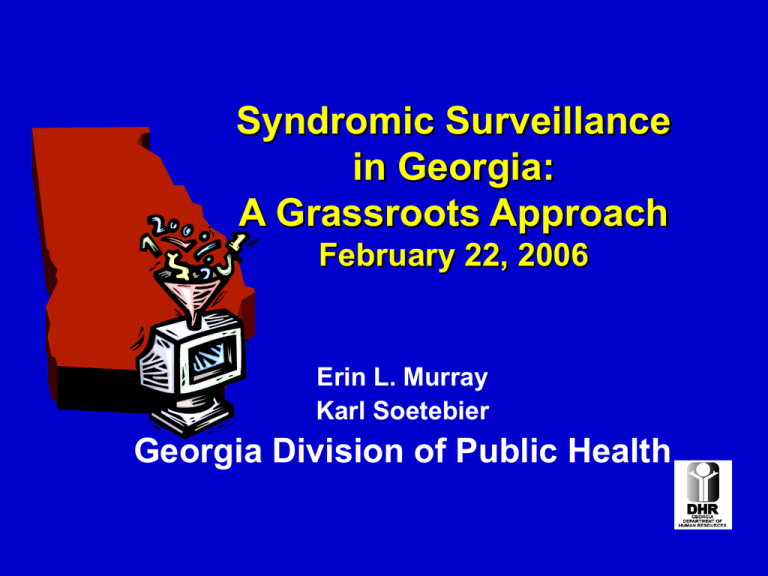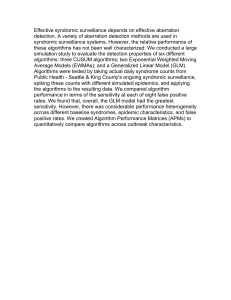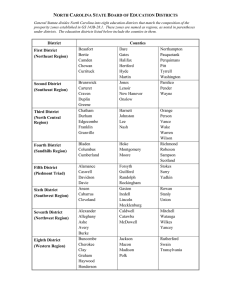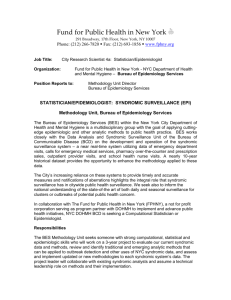Syndromic Surveillance in Georgia: A Grassroots Approach
advertisement

Syndromic Surveillance in Georgia: A Grassroots Approach February 22, 2006 Erin L. Murray Karl Soetebier Georgia Division of Public Health Overview • Why • How • What • Where Syndromic Surveillance—Why Bioterrorism – original purpose, too rare Outbreaks – real role, less common Seasonal trends – real role Pandemic preparedness – to be proven Non-ID trends – real role Bioterror Infectiou s Diseases Outbreak s Seasonal Trends & Pandemic Preparedness Chronic Diseases (non-ID) Trends and Epidemics Syndromic Surveillance—How • Utilize Health Districts – Solicit interest from facilities – Maintain relationships with data sources – Monitor flags in their districts – Coordinate response with facilities Syndromic Surveillance from the State Perspective: How Centralized approach • Health Districts compare local data to other districts and state totals • Web-based easy access (SendSS) • Data sources ▬ Clinical first ▬ Combine clinical and non-clinical Syndromic Surveillance from the State Perspective: What • • Clinical – Hospital emergency departments – Moving focus from chief complaint to textbased physician’s diagnoses – EMS dispatches (FirstWatch®) – Urgent care centers – School clinic visits – Influenza sentinel providers Non-clinical – School and employee absenteeism – RODS Syndromic Surveillance from the State Perspective: Where to focus Risk factors for Infectious Diseases Outbreaks • Tier 1: Athens, Atlanta, Augusta, Columbus, Macon, Savannah – Population Size (>100,000 population) – Population’s potential exposures – – – Participants of events (Temporary) University students (Semi-permanent) >10% foreign born persons (Perm.) State Perspective: Where continued Additional Factors • Tier 2: Albany, Dalton, Gainesville, Rome, Valdosta, Waycross – Animal Exposure – Potential for zoonotic transmission – Population’s potential exposures – – International or interstate travelers (Temporary) Seasonal workers, military recruits, university students (Semi-permanent) – Geographic coverage – North, south, east, west Syndromic Surveillance— How continued • Pipeline of key actions – State – District – Corresponding technical components Desired Variables from Emergency Departments 1. Hospital Name 8. Zip code 2. Unique patient ID 9. Chief complaint 3. Triage Date 10. MD diagnosis 4. Triage Time 11. ICD-9 5. Race 12. Acuity or Triage Score 6. Age 13. Disposition 7. Sex Who has access rights for data viewing? Participants Source of data (e.g., hospital), Districts, Multiple Districts (inter-District), State Data viewed by Individual data source Aggregate for: – District, Multiple Districts, State Syndrome Event Count Syndrome Event Graph Flag Summary • Flags PLUS • Raw Data • Only shows current Working Day Drill Down to Chief Complaint Raw Data for Specific Date and Strata GIS Data • Still under development • Release March 2006 • GA Map with Health Districts and Counties • Spatial distribution of data over time Interpretation & Possible Public Health Response “Protocol” • • • • • • • • Confirm the validity of the alert Alert hospital infection control practitioner (ICP) ICP contacts ED to evaluate the alert District contacts other like services Determine if similar alerts District/State look at other data sources Determine if similar alerts Discuss and decide upon actions School Absenteeism and Nurse Visit Data in SendSS School Absentee Counts School Absentee Graph Clinic Visit Survey Tool School information Student information Reason for visit Action taken Sentinel Provider Data in SendSS Contact Information Erin L. Murray elmurray@dhr.state.ga.us Karl Soetebier ksoetebier@dhr.state.ga.us Wendy Cameron wpcameron@dhr.state.ga.us Susan Temporado Cookson stcookson@dhr.state.ga.us





